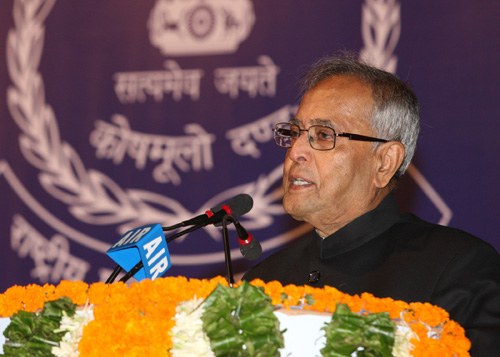
I am happy to be amidst you on this occasion of Valedictory Ceremony of the 65th Batch of IRS. At the outset, I would like to congratulate the officers, who have successfully completed their professional training.
I have had decades of association with the department from my days as MOS in Finance Ministry in the 70's. I have visited National Academy of Direct taxes (NADT), on a number of occasions. I am therefore witness to the evolution and growth of this premier academy.
The Income Tax Act is one of the oldest Acts in India. It was introduced in 1860 as a punitive tax by the British after the rebellion of 1857. Since Mr. James Wilson introduced Income Tax in British India, the Department has come a long way.
You will find it interesting to know that the collection of direct taxes in 1860-61 was just Rs. 30 lakhs. In contrast, the revised target for 2012-13 was Rs. 5,65,835 crores. As per the budget estimates for the direct taxes for the year 2013-14, the direct tax collection is likely to be around Rs. 6 lakh 68 thousand crore, which is around 54 percent of the gross tax revenue receipts of the Central Government. Not only has there been a quantum increase in the collection of direct taxes, but it now accounts for the majority of tax collections. Direct taxes are anti inflationary compared to indirect taxes. They are still below the target we want to reach but the rise to over 50 percent of revenue is a positive feature.
Tax collection is neither a simple nor popular task. Tax collectors should be conscious of the rights and duties of citizens. The tax payer should be seen as an important partner in generating revenue for all our national endeavours. It is the tax they provide which funds welfare schemes, helps maintain law and order, protect our borders etc. Many empires have collapsed in the past because Governments did not have money to pay their soldiers. Kautilya's words ‘Kosh Moolo Dandah’ i.e. "revenue is the backbone of administration” continues to be as relevant today as it was thousands of years ago.
In a globalized world, more than two-thirds of trade is between related group entities. The inter-group transactions offer an opportunity for multinational enterprises to locate their profits in favourable tax jurisdictions with low taxes or no taxes. Issues like Transfer Pricing are also very complicated. Taxation has thus acquired new complexities with political, legal as well as international ramifications. India has been taking measures in the form of Double Taxation Avoidance Agreements and Tax Information Exchange Agreements to safeguard its interests. Earlier, countries were very reluctant to share information. One of the indirect benefits of the 2008 financial crisis was that recalcitrant countries have been compelled to share information.
The Income Tax department has been one of the front runners in taking technological initiatives with a view to handle the expectations of our tax payers. A series of steps have been taken - Centralisation of tax collection, simplification of tax forms, improvements in the method of submitting taxes, simplification of tax laws etc. The modernisation of our tax laws is very important.
The Government depends on you to collect taxes from the people in an efficient manner. I have no doubt you will discharge your responsibilities to the motherland with competence and confidence.
Before I conclude, I would like to remind you about Father of our Nation Mahatma Gandhi’s Talisman:
"Whenever you are in doubt, or when the self becomes too much with you, apply the following test. Recall the face of the poorest and the weakest man [woman] whom you may have seen, and ask yourself, if the step you contemplate is going to be of any use to him [her]. Will he [she] gain anything by it? Will it restore him [her] to a control over his [her] own life and destiny? In other words, will it lead to swaraj [freedom] for the hungry and spiritually starving millions? Then you will find your doubts and yourself melt away."
I wish all of you a bright future.
